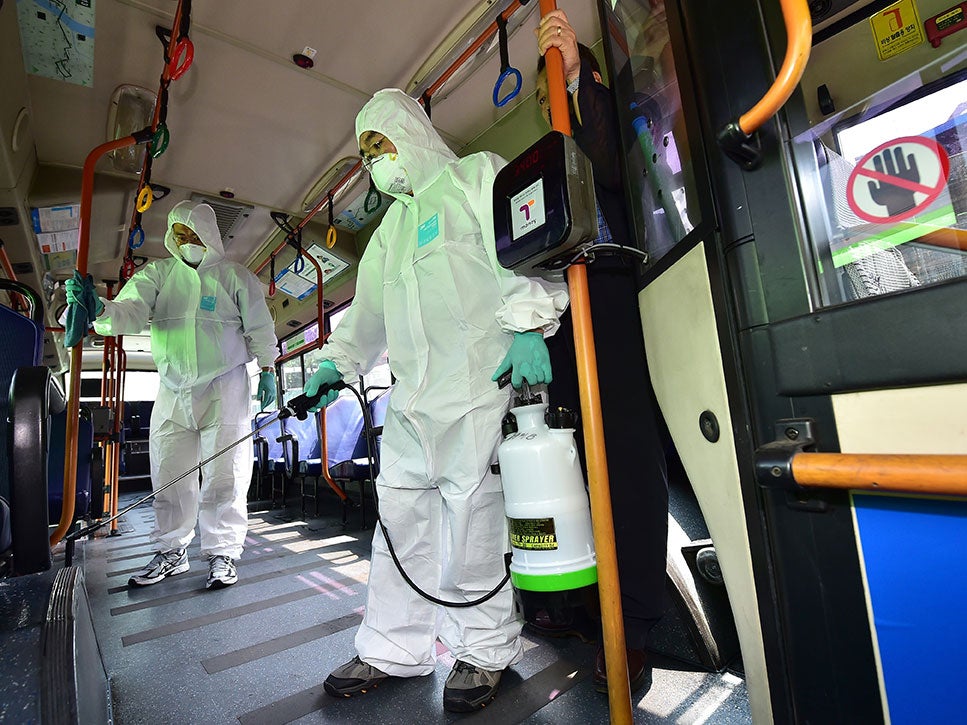Mers outbreak: WHO issues 'wakeup call' as Rep. of Korea orders hospitals to track visitors
'This outbreak is a wakeup call. All countries should always be prepared for the unanticipated possibility of outbreaks of serious infectious diseases'
Your support helps us to tell the story
From reproductive rights to climate change to Big Tech, The Independent is on the ground when the story is developing. Whether it's investigating the financials of Elon Musk's pro-Trump PAC or producing our latest documentary, 'The A Word', which shines a light on the American women fighting for reproductive rights, we know how important it is to parse out the facts from the messaging.
At such a critical moment in US history, we need reporters on the ground. Your donation allows us to keep sending journalists to speak to both sides of the story.
The Independent is trusted by Americans across the entire political spectrum. And unlike many other quality news outlets, we choose not to lock Americans out of our reporting and analysis with paywalls. We believe quality journalism should be available to everyone, paid for by those who can afford it.
Your support makes all the difference.The World Health Organisation has said in a statement that the recent large outbreak of Middle East Respiratory Syndrome in the Republic of Korea "is a wakeup call".
In the ninth meeting of the International Health Regulations Emergency Committee regarding MERS-CoV, the committee said "that this outbreak is a wakeup call and that in a highly mobile world, all countries should always be prepared for the unanticipated possibility of outbreaks of this, and other serious infectious diseases.
"The situation highlights the need to strengthen collaboration between health and other key sectors, such as aviation, and to enhance communication processes."
Director-general Margaret Chan agreed with the assessment made by the committee in a later statement.
The meeting, which took place on 16 June, heard an assessment of five main factors contributing to the spread of MERS-CoV from members and advisers of the Committee who participated in the recent Republic of Korea-WHO MERS Joint Mission.
Among the five main factors which contributed to the spread of Mers were a lack of awareness among health care workers and the general public about MERS, as well as a practice of visiting multiple hospitals for the best care, also known as ‘doctor shopping’.

Advisors to the committee from the Joint Mission also cited suboptimal infection prevention and control measures in hospitals as well as close and prolonged contact of infected MERS patients in crowded emergency rooms and multibed rooms in hospitals, as well as secondary infection of visitors to the sick.
The committee noted that there are still many gaps in knowledge regarding the transmission of this virus between people, including the potential role of environmental contamination, poor ventilation and other factors, and indicated that continued research in these areas was critical.
The committee also noted that after the outbreak was detected, and after a period of organisation, the Republic of Korea strongly initiated actions to bring the outbreak under control.
The country’s health ministry has recently ordered hospitals to track all emergency ward visitors, citing difficulties locating every person exposed to the disease.
Many caught Mers from sufferers encountered in emergency wards before they were diagnosed, during a wait for hospital places.
The difficulty of tracing those who thronged the wards for consultation made it harder to find people who needed to be isolated for suspected exposure to the disease, ministry official Kwon Deok-cheol said.
"This issue has been raised as one of the biggest problems, as we looked at the trend of the MERS outbreak," Kwon, the ministry's head of health care policy, told a news briefing.
Hospitals are now required to keep a record of all patients and family members as well as ambulance workers and the time of their visits, the ministry said.
On Thursday, the ministry reported two more deaths from the disease, taking the toll to 29, besides reporting one new case.
Most of the deaths have been among elderly patients or those already suffering illnesses. There are 77 people still being treated in hospital, the ministry said.
Additional reporting Reuters
Join our commenting forum
Join thought-provoking conversations, follow other Independent readers and see their replies
Comments